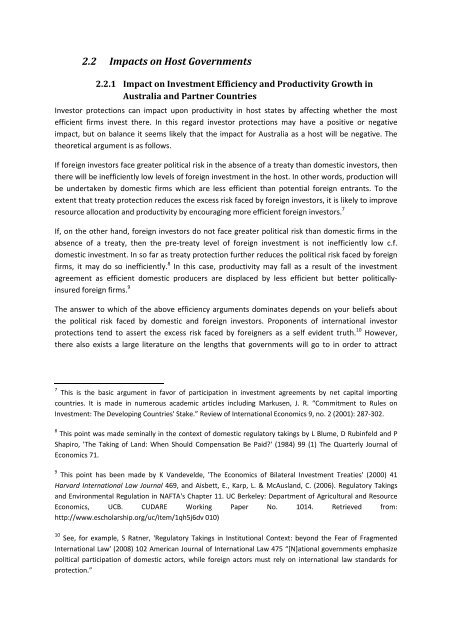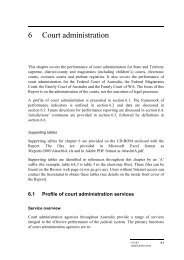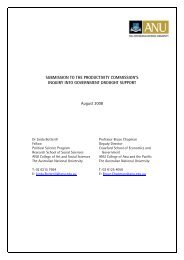Dr Emma Aisbett and Jonathan Bonnitcha (PDF - 202 - Productivity ...
Dr Emma Aisbett and Jonathan Bonnitcha (PDF - 202 - Productivity ...
Dr Emma Aisbett and Jonathan Bonnitcha (PDF - 202 - Productivity ...
Create successful ePaper yourself
Turn your PDF publications into a flip-book with our unique Google optimized e-Paper software.
2.2 Impacts on Host Governments<br />
2.2.1 Impact on Investment Efficiency <strong>and</strong> <strong>Productivity</strong> Growth in<br />
Australia <strong>and</strong> Partner Countries<br />
Investor protections can impact upon productivity in host states by affecting whether the most<br />
efficient firms invest there. In this regard investor protections may have a positive or negative<br />
impact, but on balance it seems likely that the impact for Australia as a host will be negative. The<br />
theoretical argument is as follows.<br />
If foreign investors face greater political risk in the absence of a treaty than domestic investors, then<br />
there will be inefficiently low levels of foreign investment in the host. In other words, production will<br />
be undertaken by domestic firms which are less efficient than potential foreign entrants. To the<br />
extent that treaty protection reduces the excess risk faced by foreign investors, it is likely to improve<br />
resource allocation <strong>and</strong> productivity by encouraging more efficient foreign investors. 7<br />
If, on the other h<strong>and</strong>, foreign investors do not face greater political risk than domestic firms in the<br />
absence of a treaty, then the pre‐treaty level of foreign investment is not inefficiently low c.f.<br />
domestic investment. In so far as treaty protection further reduces the political risk faced by foreign<br />
firms, it may do so inefficiently. 8 In this case, productivity may fall as a result of the investment<br />
agreement as efficient domestic producers are displaced by less efficient but better politically‐<br />
insured foreign firms. 9<br />
The answer to which of the above efficiency arguments dominates depends on your beliefs about<br />
the political risk faced by domestic <strong>and</strong> foreign investors. Proponents of international investor<br />
protections tend to assert the excess risk faced by foreigners as a self evident truth. 10 However,<br />
there also exists a large literature on the lengths that governments will go to in order to attract<br />
7 This is the basic argument in favor of participation in investment agreements by net capital importing<br />
countries. It is made in numerous academic articles including Markusen, J. R. “Commitment to Rules on<br />
Investment: The Developing Countries' Stake.” Review of International Economics 9, no. 2 (2001): 287‐302.<br />
8 This point was made seminally in the context of domestic regulatory takings by L Blume, D Rubinfeld <strong>and</strong> P<br />
Shapiro, 'The Taking of L<strong>and</strong>: When Should Compensation Be Paid?' (1984) 99 (1) The Quarterly Journal of<br />
Economics 71.<br />
9 This point has been made by K V<strong>and</strong>evelde, 'The Economics of Bilateral Investment Treaties' (2000) 41<br />
Harvard International Law Journal 469, <strong>and</strong> <strong>Aisbett</strong>, E., Karp, L. & McAusl<strong>and</strong>, C. (2006). Regulatory Takings<br />
<strong>and</strong> Environmental Regulation in NAFTA's Chapter 11. UC Berkeley: Department of Agricultural <strong>and</strong> Resource<br />
Economics, UCB. CUDARE Working Paper No. 1014. Retrieved from:<br />
http://www.escholarship.org/uc/item/1qh5j6dv 010)<br />
10 See, for example, S Ratner, 'Regulatory Takings in Institutional Context: beyond the Fear of Fragmented<br />
International Law' (2008) 102 American Journal of International Law 475 “[N]ational governments emphasize<br />
political participation of domestic actors, while foreign actors must rely on international law st<strong>and</strong>ards for<br />
protection.”

















